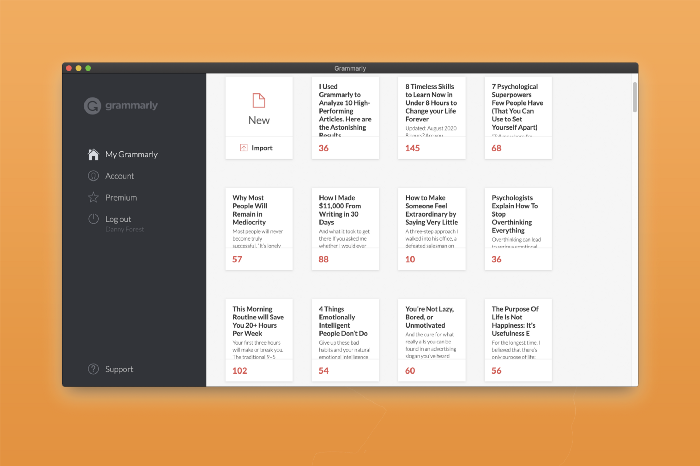Cover Image: Screenshot of articles analyzed in Grammarly
Can you really take the tool seriously?
So, you think Grammarly is the holy grail of writing, right?
Do you also think that all top writers have perfect-scoring articles?
Think again!
For the past month or so, I’ve been analyzing the highest performing articles on Medium to figure out what makes them tick. I decided to have some fun and see how each compared with some of my articles using Grammarly, which is likely one of the most popular tools writers use.
I found pretty interesting results from the analysis, and I want to share some of them here.
Note that I didn’t play around with the criteria (see below) so that they all get analyzed the same way. Some articles might be more informal and may have performed better if that setting was chosen for formality.
And a word of caution: It’s hard to make any serious conclusions from a sample of 10 articles only. It’s possible that if the list were to have 100 entries, the results would be different. However, that data doesn’t exist as the top 100 highest-performing articles vary greatly in read time, views, claps, etc.
Anyway, enjoy the read!
Criteria
For each article, I’ve used these criteria:
Audience: Knowledgeable
Formality: Neutral
Domain: General
Tone: None chosenResults Summary
Results compiled from using Grammarly
Observations
Only Barry Davret, with his article “How to Make Someone Feel Extraordinary by Saying Very Little,” scored almost perfectly.
The most popular article, by Darius Foroux, is arguably the least-performing one on Grammarly.
All of the articles were at least
engaging.Most articles had a
slightly offdelivery.With two exceptions, all articles have over 30
premium alerts.Two articles, one by Benjamin Hardy, PhD and one by Ayodeji Awosika, had nothing to make them stand out on Grammarly.
60% of articles had an
overall scoreabove 90.Apart from one outlier, all had fewer than 15
correctnessalerts.
Conclusions
You don’t need a perfect Grammarly report to have a hit article.
Your article likely needs to be
clearorvery clearto succeed.Your article likely needs to be
engagingorvery engagingto succeed.Aiming for an
overall scoreof about 90 can help your article be more popular.Deliverydoesn’t seem to matter.Premium alertsdon’t seem to matter.Perfect spelling doesn’t guarantee success.
Imperfect spelling doesn’t guarantee failure.
So, Do You Need Grammarly to Succeed?
Technically, you don’t. But it helps. Grammarly remains just a tool. Follow your heart when you don’t agree with its suggestions.
That being said, I wouldn’t be the writer I am today without it. If you run Grammarly on my old articles before I was using it, they are filled with easy-to-fix mistakes.
While the majority of people will tolerate a few mistakes here and there, added up, it reduces the quality of your work. And sometimes, it affects your reputation too.
The “8 timeless skills article,” ranked 10th in the popularity list above, was originally published before I was using Grammarly. I only realized 20 months after it was published that there were errors all over. It was deeply flawed yet it still managed to succeed.
One thing to note about Grammarly is that it can limit your creativity and style. It tells you what you should do, overlooking your preferences. If all writers were to accept their suggestions, everyone would write the same way. And that would be boring.
I just use it to correct my spelling mistakes and take every suggestion with a grain of salt. When you do that, I think it’s worth using.
What are your thoughts?
— Danny


